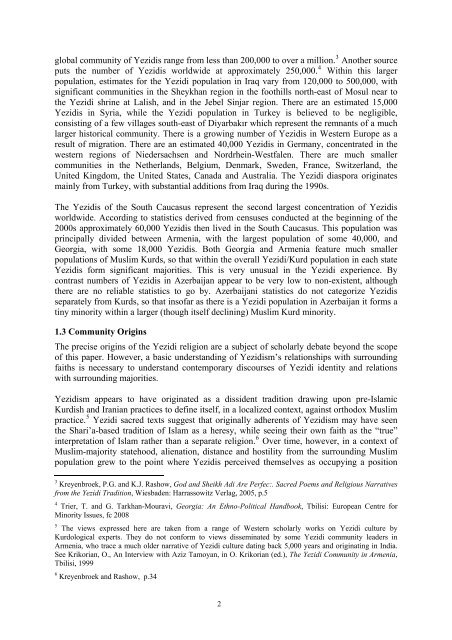The Human Rights situation of the Yezidi minority - UNHCR
The Human Rights situation of the Yezidi minority - UNHCR
The Human Rights situation of the Yezidi minority - UNHCR
Create successful ePaper yourself
Turn your PDF publications into a flip-book with our unique Google optimized e-Paper software.
global community <strong>of</strong> <strong>Yezidi</strong>s range from less than 200,000 to over a million. 3 Ano<strong>the</strong>r source<br />
puts <strong>the</strong> number <strong>of</strong> <strong>Yezidi</strong>s worldwide at approximately 250,000. 4 Within this larger<br />
population, estimates for <strong>the</strong> <strong>Yezidi</strong> population in Iraq vary from 120,000 to 500,000, with<br />
significant communities in <strong>the</strong> Sheykhan region in <strong>the</strong> foothills north-east <strong>of</strong> Mosul near to<br />
<strong>the</strong> <strong>Yezidi</strong> shrine at Lalish, and in <strong>the</strong> Jebel Sinjar region. <strong>The</strong>re are an estimated 15,000<br />
<strong>Yezidi</strong>s in Syria, while <strong>the</strong> <strong>Yezidi</strong> population in Turkey is believed to be negligible,<br />
consisting <strong>of</strong> a few villages south-east <strong>of</strong> Diyarbakır which represent <strong>the</strong> remnants <strong>of</strong> a much<br />
larger historical community. <strong>The</strong>re is a growing number <strong>of</strong> <strong>Yezidi</strong>s in Western Europe as a<br />
result <strong>of</strong> migration. <strong>The</strong>re are an estimated 40,000 <strong>Yezidi</strong>s in Germany, concentrated in <strong>the</strong><br />
western regions <strong>of</strong> Niedersachsen and Nordrhein-Westfalen. <strong>The</strong>re are much smaller<br />
communities in <strong>the</strong> Ne<strong>the</strong>rlands, Belgium, Denmark, Sweden, France, Switzerland, <strong>the</strong><br />
United Kingdom, <strong>the</strong> United States, Canada and Australia. <strong>The</strong> <strong>Yezidi</strong> diaspora originates<br />
mainly from Turkey, with substantial additions from Iraq during <strong>the</strong> 1990s.<br />
<strong>The</strong> <strong>Yezidi</strong>s <strong>of</strong> <strong>the</strong> South Caucasus represent <strong>the</strong> second largest concentration <strong>of</strong> <strong>Yezidi</strong>s<br />
worldwide. According to statistics derived from censuses conducted at <strong>the</strong> beginning <strong>of</strong> <strong>the</strong><br />
2000s approximately 60,000 <strong>Yezidi</strong>s <strong>the</strong>n lived in <strong>the</strong> South Caucasus. This population was<br />
principally divided between Armenia, with <strong>the</strong> largest population <strong>of</strong> some 40,000, and<br />
Georgia, with some 18,000 <strong>Yezidi</strong>s. Both Georgia and Armenia feature much smaller<br />
populations <strong>of</strong> Muslim Kurds, so that within <strong>the</strong> overall <strong>Yezidi</strong>/Kurd population in each state<br />
<strong>Yezidi</strong>s form significant majorities. This is very unusual in <strong>the</strong> <strong>Yezidi</strong> experience. By<br />
contrast numbers <strong>of</strong> <strong>Yezidi</strong>s in Azerbaijan appear to be very low to non-existent, although<br />
<strong>the</strong>re are no reliable statistics to go by. Azerbaijani statistics do not categorize <strong>Yezidi</strong>s<br />
separately from Kurds, so that ins<strong>of</strong>ar as <strong>the</strong>re is a <strong>Yezidi</strong> population in Azerbaijan it forms a<br />
tiny <strong>minority</strong> within a larger (though itself declining) Muslim Kurd <strong>minority</strong>.<br />
1.3 Community Origins<br />
<strong>The</strong> precise origins <strong>of</strong> <strong>the</strong> <strong>Yezidi</strong> religion are a subject <strong>of</strong> scholarly debate beyond <strong>the</strong> scope<br />
<strong>of</strong> this paper. However, a basic understanding <strong>of</strong> <strong>Yezidi</strong>sm’s relationships with surrounding<br />
faiths is necessary to understand contemporary discourses <strong>of</strong> <strong>Yezidi</strong> identity and relations<br />
with surrounding majorities.<br />
<strong>Yezidi</strong>sm appears to have originated as a dissident tradition drawing upon pre-Islamic<br />
Kurdish and Iranian practices to define itself, in a localized context, against orthodox Muslim<br />
practice. 5 <strong>Yezidi</strong> sacred texts suggest that originally adherents <strong>of</strong> <strong>Yezidi</strong>sm may have seen<br />
<strong>the</strong> Shari’a-based tradition <strong>of</strong> Islam as a heresy, while seeing <strong>the</strong>ir own faith as <strong>the</strong> “true”<br />
interpretation <strong>of</strong> Islam ra<strong>the</strong>r than a separate religion. 6 Over time, however, in a context <strong>of</strong><br />
Muslim-majority statehood, alienation, distance and hostility from <strong>the</strong> surrounding Muslim<br />
population grew to <strong>the</strong> point where <strong>Yezidi</strong>s perceived <strong>the</strong>mselves as occupying a position<br />
3 Kreyenbroek, P.G. and K.J. Rashow, God and Sheikh Adi Are Perfec:. Sacred Poems and Religious Narratives<br />
from <strong>the</strong> <strong>Yezidi</strong> Tradition, Wiesbaden: Harrassowitz Verlag, 2005, p.5<br />
4<br />
Trier, T. and G. Tarkhan-Mouravi, Georgia: An Ethno-Political Handbook, Tbilisi: European Centre for<br />
Minority Issues, fc 2008<br />
5 <strong>The</strong> views expressed here are taken from a range <strong>of</strong> Western scholarly works on <strong>Yezidi</strong> culture by<br />
Kurdological experts. <strong>The</strong>y do not conform to views disseminated by some <strong>Yezidi</strong> community leaders in<br />
Armenia, who trace a much older narrative <strong>of</strong> <strong>Yezidi</strong> culture dating back 5,000 years and originating in India.<br />
See Krikorian, O., An Interview with Aziz Tamoyan, in O. Krikorian (ed.), <strong>The</strong> <strong>Yezidi</strong> Community in Armenia,<br />
Tbilisi, 1999<br />
6 Kreyenbroek and Rashow, p.34<br />
2
















